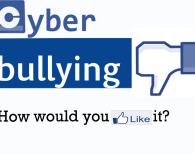NIOS Brings Anti-Bullying Tools to PTAs
Arizona

Here you will find a Not On Our Campus Proclamation from Scottsdale Community College, in Scottsdale, AZ. The proclamation opposes hate violence and promotes safety, inclusion, and acceptance on the Scottsdale Communty College campus. This proclamation also designates a Not In Our Town Day.
Download and adapt for your campus.
This is a background piece on the meaning of a "hate crime" in the five-part series published by our public media partners at Fronteras.
Defining Hate Crimes
By Jude Joffe-Block
PHOENIX — This week we launch our five-part Fronteras Desk series, The Search For Tolerance. Five reporters in five cities checked on the ways that communities are trying to prevent hate crimes. The stories air on several public radio stations in the Southwest this week.
But as communities work to prevent hate, a question often arises when some form of harassment or discrimination does occur: Was that a hate crime?
During the last few decades, the vast majority of states have added hate crime laws to their books. These statutes allow longer criminal sentences if there is evidence that a crime was motivated by bias.
At a recent town meeting in the Phoenix suburb of Gilbert, concerned residents and the police chief entered into a dialogue about the legal definition of a hate crime.
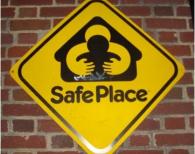
This is the third in a five-part series published by our public media partneras at Fronteras. Listen to the accompanying radio piece.
By Adrian Florido
LGBT Group Builds Support In Southern Arizona
TUCSON, Ariz. — In Tucson, Ariz., a nonprofit group is working to reduce hate and bias against the LGBT community. It’s called Wingspan and it is doing so through education; training even government organizations about tolerance within the ranks.
Inside the airy rooms of Studio One, a group of artists is meeting on a late Saturday afternoon. The logistics are a little daunting but they have no shortage of volunteers. They are preparing for a Latino gay pride festival.
The circle of artists brings together burlesque performers, photographers, event planners, singers, dancers and poets.

This is the first in a five-part series published by our public media partneras at Fronteras. Listen to the accompanying radio piece.
By Jude Joffe-Block
PHOENIX — Gilbert, Ariz. is a bedroom community outside of Phoenix that has seen explosive population growth in recent decades. As it grew from a small, conservative farming town into a more diverse community, some notable tensions arose.
“In 1993, our detectives started to identify in the town of Gilbert a gang that called themselves White Power,” said police spokesman Sergeant Bill Balafas.
Six years later, a spin-off gang called the Devil Dogs emerged among football players at Highland High School.
“Their belief system, we learned, was for white people and anti everything else,” Balafas said. “So they were racists, but that didn't mean they didn't beat up white people, they just beat up everybody.”
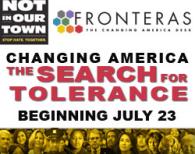
Tune into this original Not In Our Town programming from our public media partners at Fronteras.
We asked you this question in October 2011: Does your community make you feel safe and included, or scared and marginalized?
The Fronteras: Changing America Desk has joined forces with Not in Our Town documentary producers to determine how hate affects communities throughout the Southwest and what people like you are doing about it.
Tune in to hear these stories on KJZZ at 6:30 and 8:30 a.m. during Morning Edition
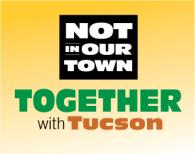
CLICK HERE TO SEE HOW YOU CAN STAND WITH TUCSON.
This week, in the wake of tragedy, Tucson witnessed—and inspired—an amazing coming-together of people by the tens of thousands. In both grief and solidarity, the people of Tucson have hosted vigils and memorials, with cities around the country following suit. They have created online groups and organized on-the-ground action. There are angels watching over the families of victims and cyclists whizzing through the streets. Yesterday evening, more than 26,000 attended the public memorial in Tucson at the University of Arizona, including President Obama.
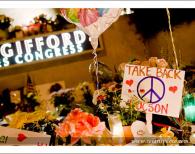
When these days become a museum exhibit hall centuries from now, what will it say about us? And what will it say about this past Saturday? Was it the start of something terrible? Or of something amazing?
—Ulises Silva, Being Latino
This week we remember those who were killed and wounded in Tucson, Ariz. in an assassination attempt on U.S. Congresswoman Gabrielle Giffords. The majority of Americans grieve together. No matter how you view these events, this is a pivotal moment.

What would you do if the governor said one of your classes was now illegal?
That's what's happening in Arizona, where the governor just signed a bill aimed at banning ethnic studies in the public schools.
Judy Burns (pictured above), president of the school district in Tucson, Arizona, says those classes will go on anyway. She sees how important they are to the students.
"I see how engaged the kids are in their education, some of them for the very first time," she says. "They feel empowered. It wakes them up to the possibilities of their future. "
On May 11, Arizona passed a law that would ban classes designed primarily for students of particular ethnic groups, or that advocate ethnic solidarity or promote resentment of a race or a class of people. Any district teaching such classes would risk losing 10 percent of its state financing once the law goes into effect Dec. 31.
Rather than being divisive, as supporters of the new law claim, Burns says ethnic studies make students more sensitive to the history and culture of other peoples, as well as proud of their own. It makes them better citizens.
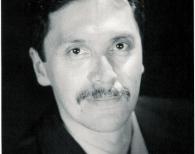
The following is part of an essay by Not In Our Town activist Hugh Vasquez of Walnut Creek, CA, addressing the human impact of Arizona's controversial new legislation aimed at undocumented immigrants. Vasquez, a partner with the Center for Diversity Leadership and a Senior Associate at the Bay Area Coalition for Equitable Schools, writes that his concern is not with the intentions of those who wrote the law, but its impact on the state's Latino residents and the inevitable racial profiling that will result.
Have you, or anyone you know, been the victim of racial or ethnic profiling? Do you agree with Vasquez that this is one of the dangers inherent in Arizona's new legislation? Please consider his words, and add your comments below.
